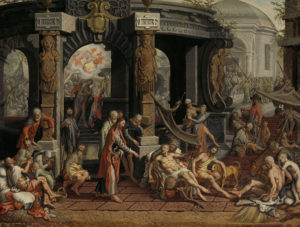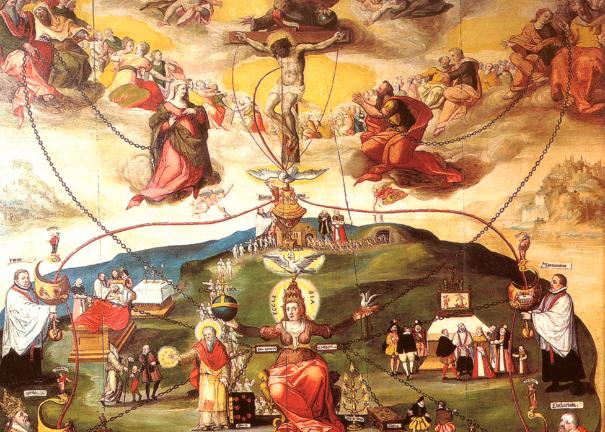In the Catholic faith, there are seven Sacraments: Baptism, the Eucharist, Reconciliation and Penance, Confirmation, Marriage, Holy Orders and Anointing of the Sick. The Sacraments are reminders that Jesus is at work in people’s lives. Catholics celebrate their faith through the Sacraments. The Sacraments mark many milestones in a Catholic’s life.
Sacraments of Christian Initiation-
Baptism, Confirmation and the Eucharist are called the Sacraments of Christian Initiation. Adults may receive these Sacraments all at one time, but, for a person who is born into the Catholic faith, these come at different times.
Whether for a baptized baby or an adult, baptism is the Sacrament that wipes away all sin, including Original Sin. It’s a renewal and rebirth. When a person is baptized, he or she leaves the old life behind and starts a new one with Jesus. Baptism marks the person as a member of the Church and as a follower of Christ. If an adult is converting to Catholicism and has been baptized in another Christian church, they do not need to be baptized again. Most Christian baptisms are recognized by the Church.
 Confirmation is the Sacrament that finishes a person’s baptism. The Sacrament of Confirmation normally happens when a person is in his or her teens. It varies from diocese to diocese, but 15 or 16 years of age is the norm. Think of the word “confirm,” and you’ll get the idea of what Confirmation is all about. It’s a celebration to proclaim that, yes, you are a follower of Jesus and a member of the Catholic Church. Sometimes, this Sacrament is referred to as being sealed in the Holy Spirit. A person being Confirmed usually picks the name of a saint to take on as part of his or her own name. Usually, this is a saint that has a special meaning to the person.
Confirmation is the Sacrament that finishes a person’s baptism. The Sacrament of Confirmation normally happens when a person is in his or her teens. It varies from diocese to diocese, but 15 or 16 years of age is the norm. Think of the word “confirm,” and you’ll get the idea of what Confirmation is all about. It’s a celebration to proclaim that, yes, you are a follower of Jesus and a member of the Catholic Church. Sometimes, this Sacrament is referred to as being sealed in the Holy Spirit. A person being Confirmed usually picks the name of a saint to take on as part of his or her own name. Usually, this is a saint that has a special meaning to the person.
Eucharist or Communion is the Sacrament that sustains your beliefs. The action of eating and drinking the body and blood of Christ helps strengthen you in your faith and in your everyday life. For Catholics, this is not a symbol or a myth; the Eucharist is actually the body and blood of Christ and should never be taken lightly or without thought. Every time a Catholic receives Communion, he or she should be changed for the better. Catholics believe you need to be in a state of grace before receiving, and you should not participate if you have a sin, venial or mortal, that needs to be confessed.
The Sacraments of Healing-
Reconciliation and Penance, sometimes called Confession, is one of the greatest gifts a Catholic has at his or her disposal. Confessing sins to another human are not easy. It takes courage and mettle to sit down with a priest, a holy man, and tell him all the things you’ve done wrong.
Many people, Catholics and non-Catholics alike misunderstand this Sacrament. Reconciliation is not licensed to go out and do what you want without thought. Just the opposite is true. Once you confess your sins, you must own them and reconcile them. The gift in this Sacrament is that no matter what you’ve done, God forgives you. The stipulation is that you must try to do better and you must do penance to help you overcome your sins and weaknesses.
The Anointing of the Sick used to be called Last Rites in days gone by.
Imagine how an ill person would feel when a priest was called in for the Last Rites? Not very good, which was part of the reason for changing the name of the Sacrament. A priest will bless a person who is either near the end of life, seriously ill, weakened by age, preparing for major surgery or mentally ill. A Catholic can receive communion during this Sacrament.
The Sacraments of Service –
Marriage and Holy Orders are the Sacraments of Service, sometimes called the Sacraments of Service to Community or Sacraments of Service to Communion. These are Sacraments that commit you to aid the community of the Church.
According to “The Everything Catholicism Book” by Helen Keeler and Susan Grimbly, marriage is the “newest” sacrament, having been instituted around the year 1200. Marriage is a vow of exclusive love and a pledge to each other in the name of Christ for a permanent, lifetime commitment. The interesting thing about this Sacrament is that the husband and wife carry out the Sacrament with each other, rather than the priest or deacon doing so. Catholic marriage is not a contract the way a civil ceremony is. Catholic marriage is more of a pact between the couple and God.
Holy Orders, or becoming a priest, is an important Sacrament. Determining if you’ve been called by God to serve the church as a priest is not a snap decision. People who feel they’ve been called to this Sacrament need to do a lot of thoughtful prayers and spend a great deal of time deciding if this is a true calling or not. God calls people in many ways, and not everyone who thinks he or she might want to be a priest continues on to become one.
The Seven Sacraments of the Catholic Church are signs that Christ embraces everyone and can help them in all aspects of their lives, from birth through death. Whenever Catholics participate in the Sacraments they are touched by Christ and are called to be the best persons they can be.






